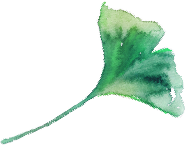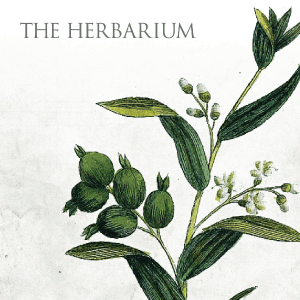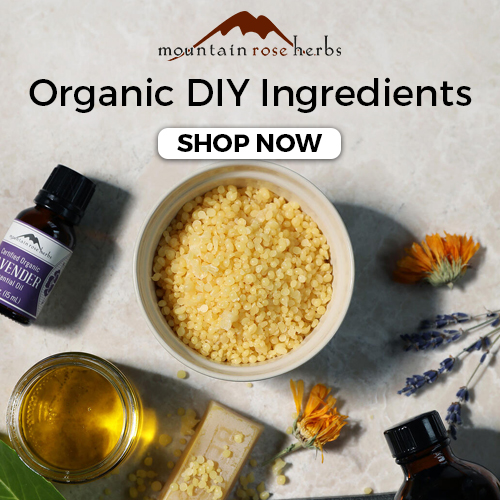
Herb collections are like personal potion shops, with hundreds and hundreds of possibilities for formulas and remedies. Slowly curating your own home apothecary should be a gradual process. This makes your herbal choices, supplies and needs very intentional. In my clinical dispensary, I had about seventy five herbs in stock throughout the seasons. In my home apothecary, however, I keep it to roughly ten. I personally prefer to stick to a small number of herbs that I know intimately and precisely for their generous number of uses, and mix and match as I need. The herbs you rely on in your apothecary at home is entirely up to you.
Read More: An Herbalists Guide to Stocking Your Apothecary
Over the years, I’ve had lots of people ask me where to start when they want to cultivate their own home apothecary for their every day health needs. It’s so fun to create a little nook in your home with your remedies and herbs and spices and teas and tinctures to play with and actually use for good old fashioned preventative and acute care. Like I say – herbal medicine is amazingly simple and also amazingly complex. Starting your own herbal collection at home doesn’t have to be done in one fell swoop – it’s a process. A process depending on what you and your family’s needs are. I would break down what herbs to invest in by category and action, and then start trying them out yourself to see which are the most effective for you. Here are some basic botanical herbal actions to pick and choose from (although not nearly a complete list):
Herbal Actions For Your Home Apothecary
Adaptogen (increases endurance and resistance to stress)
Ashwagandha, Holy Basil, Licorice, Milky Oat Tops, Nettle
Analgesics (Pain relieving)
Skullcap, ashwagandha
Antispasmodics (prevents and relieves spasms)
Chamomile, Peppermint, Skullcap, Yarrow, Wild Yam
Anti-inflammatory
Ashwagandha, Chamomile, Cinnamon, Holy Basil, Nettle, Turmeric, Yarrow
Anti-microbial
Chamomile, Elderberries, Yarrow, Ginger, Goldenseal
Bitters
Chamomile, Gentian, Dandelion leaf
Carminative (soothes digestion, relieves gas & bloating)
Fennel, Cardamom, Chamomile
Demulcent (to soothe inflamed tissues)
Marshmallow, Slippery Elm bark
Expectorant (increases the elimination of excess mucus)
Mullein, Wild Cherry, Thyme
Hepatic (liver protecting)
Burdock, Dandelion root, Turmeric, Reishi
Immune Stimulant (to acutely increase immune activity)
Echinacea root, Elderberries
Immune Modulator (to balance and support the immune system)
Astragalus, Reishi, Elderberries, Turmeric
Lymphatic
Calendula
Nutritive
Alfalfa, Nettle, Slippery Elm, Milky Oat, Reishi
Sedative/anxiolytic (calms the body and nervous system)
Chamomile, Ashwagandha, Skullcap, Passionflower, Valerian, Kava kava, Lemon balm
Stimulant (increases circulation and breaks through obstructions)
Ginger, Turmeric, Rosemary
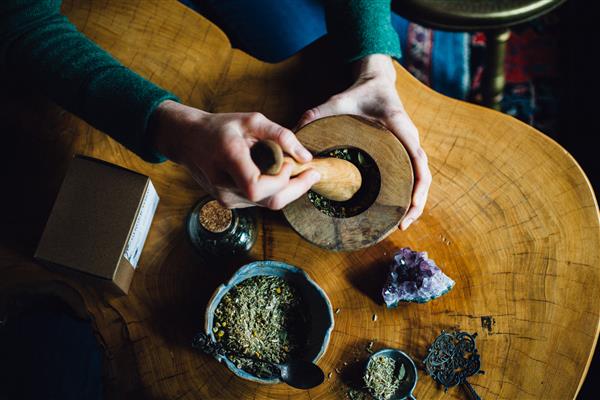
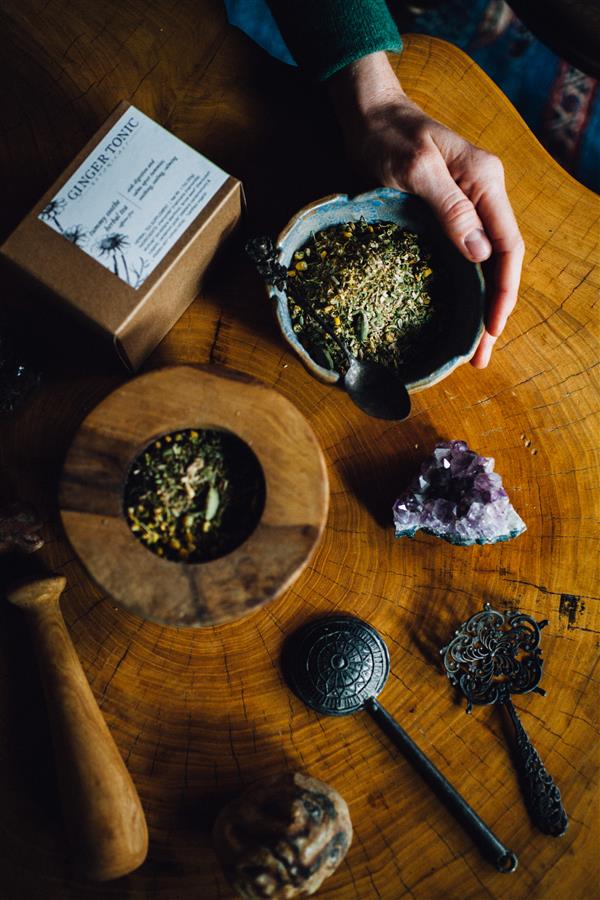
How to Store Herbs
This is important if you plan on keeping your herbs for any length of time. Herbs, like food, have a shelf life much dependent on the manner in which they’re kept.
Rule #1 – keep them out of direct sunlight (this causes them to break down and “age” more quickly).
Rule #2 – dried herbs for tea and infusions must be stored and kept completely dry. Moisture is the kiss of death to most herbs. Make sure they’re good and dry if you’re harvesting and drying your own.
Rule #3 – store loose herbs in air tight (preferably glass) containers like mason jars or amber glass bottles. Air oxidizes herbs over time, making them break down more quickly.
Rule #4 – LABEL YOUR JARS. I know you think you’ll remember them, and your sense of smell is keen and unmatched…but you probably won’t. Label the herb (common and botanical name), the date you collected or packaged it, and where it came from.
Extra Tools For Your Herbal Apothecary
Most of the items below (and lots of extras!) can be found at Mountain Rose Herbs.
Small and large ball jars or amber glass jars, mortar and pestle, empty heat-and-seal tea bags or muslin bags, base oils for infused oils (I like apricot kernel oil, olive oil, sesame oil or grape seed oil), beeswax and butters for salve making, digital kitchen scale (weighing in grams), and 1 ounce and 2 ounce dropper bottles for travel sized tinctures.
Documenting Your Materia Medica
When you try an herb for the first time (or even the tenth time), write down your experience with it in your own materia medica journal. Keeping an herb journal will help you refine your apothecary to keeping and utilizing only the most effective herbs and combinations of herbs that work well for what you need. It’s easy to have a ramshackle apothecary that quickly becomes messy, unorganized and filled with expired or unused herbs. Keeping track and routinely rotating and freshly stocking your supply is made much simpler when you keep track of your herbs and your relationship with them.
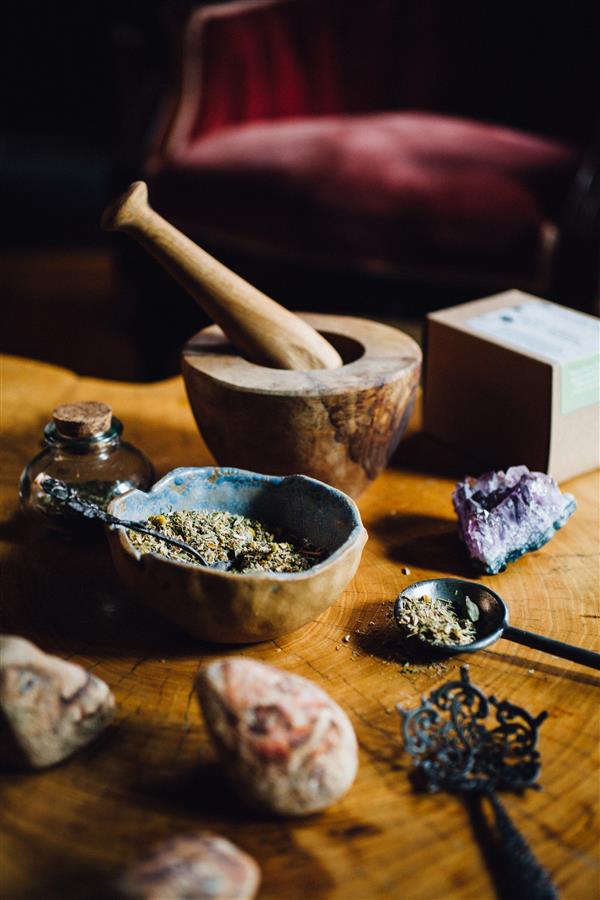
Now What? For even more apothecary fun, read my Guide to Herbal Formulating.
Begin your own herbal medicine studies with the super comprehensive Introductory Herbal Course with the Herbal Academy, or deepen your knowledge even further with the Clinical Herbalist Package and really take off!
Herb Stock Lists
